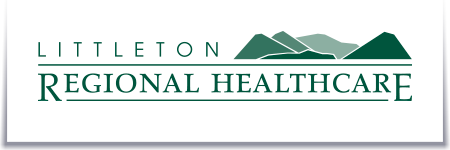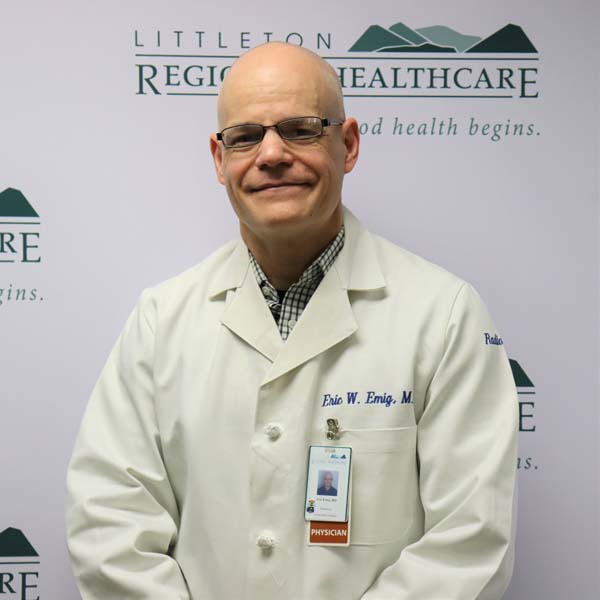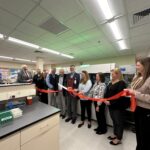Our mission is excellence in everything we do.
Littleton Regional Healthcare’s Diagnostic Imaging Services department is one of the top radiology departments in northern New Hampshire. Every day we strive to deliver the right care at the right time demonstrating our expertise and patient-centered care philosophy. We perform more than 25,000 examinations annually.
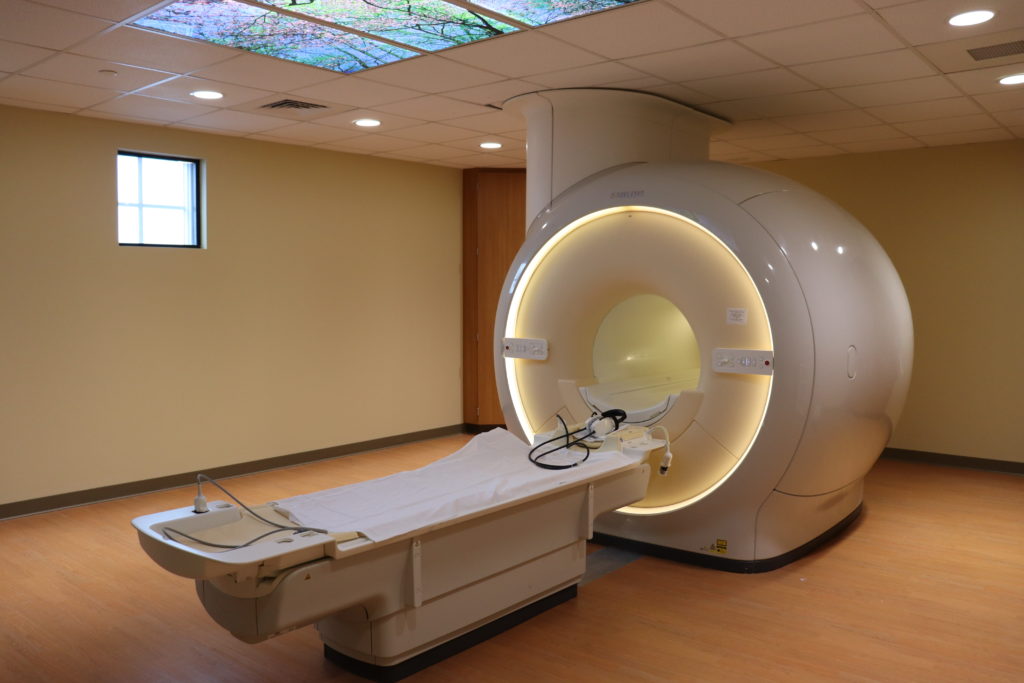
Radiology Patient Care Services
LRH’s Diagnostic Imaging Services department provides diagnostic radiology services for outpatients and inpatients.
Emergency radiology services (x-ray and CT) are available 24 hours a day at LRH. Plain film radiographic examinations are offered on a walk-in basis, Monday through Friday. CT, MRI, ultrasound, nuclear medicine, bone density, and mammographic examinations are scheduled by appointment.
Why Choose LRH?
The Littleton Regional Healthcare Diagnostic Imaging Services department has provided high-quality services since 1907. We are proud to be a part of a hospital that is dedicated to a mission of excellence in patient care.
Diagnostic Imaging Providers
More Information
Pick Up By a Patient
Patient CDs can be picked up from 7:00 AM – 5:00 PM at Littleton Regional Healthcare. Please call ahead at 603-444-9536 to allow time for the images to be prepared. To arrange to pick up images outside of these hours, please call 603-444-9536. Please note that: CDs can only be released to the patient.
Pick Up For a Patient
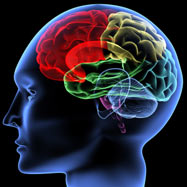
An authorization signed by the patient (or the legally authorized representative of the patient) is required for anyone other than the patient to pick up CDs or any medical information. Please fill out the Authorization for the Use and Disclosure of Health Information Form and bring the completed form to Littleton Regional Healthcare. Patient CDs can be picked up from 7:00 AM – 5:00 PM at the Diagnostic Imaging Services department.
Sending Exams to Another Provider or Institution
Patients wishing to have their x-rays sent to another provider or healthcare facility can fill out and fax the Authorization to Release Patient Information Form (PDF) to 603-575-6276.
Outside Studies
Images from other institutions
If you are bringing radiology studies from an outside institution, please ask your provider to put the x-rays on a CD-ROM in DICOM format.
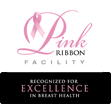 Now that lower-dose 3D mammography is available at Littleton Regional Healthcare, you may have questions. We have prepared FAQs about 3D mammography (PDF) to address concerns you may have.
Now that lower-dose 3D mammography is available at Littleton Regional Healthcare, you may have questions. We have prepared FAQs about 3D mammography (PDF) to address concerns you may have.
Thank you for choosing Littleton Regional Healthcare for your breast imaging needs. Mammography is a specialized medical imaging exam that uses low-dose x-rays to evaluate breast tissue. The goal of mammography is the early detection of breast cancer, or other factors that may lead to breast cancer. Screening mammograms are recommended every year for women starting at the age of 40. If you determine with your provider that you have a high risk of breast cancer, screening mammography may be started at an earlier age. Littleton Regional Healthcare is an American College of Radiology and FDA accredited 3D mammography facility. Your exam will be performed by a registered technologist.
Please remember not to wear any powders, lotions, or deodorants on the day of your exam, as some of these products contain metals that can show up in the images. You will be asked to change into a gown, removing all clothing from the waist up. The technologist will go over a screening form with you before your exam is performed. Your health history screening information is entered into our breast imaging tracking software. This software helps us to calculate your risk factors for breast disease and allows us to maintain and retain history information for any follow-ups or associated breast imaging as needed for as long as you are a patient with us. The exam will be performed with the patient standing for 15-30 minutes, and the technologist will explain the procedure as it is being performed. We are also able to accommodate patients who are unable to stand for long periods of time or who are in a wheelchair. Your mammogram will be performed using a soft foam cushion called a MammoPad. The MammoPad is cleared for use by the FDA, and was designed by a female breast surgeon to make patients more warm, relaxed, and generally comfortable during mammogram procedures while not impairing image quality.
- Mammograms are by appointment only and are offered Monday, 8:30 am-3:30 pm; Tuesday – Thursday, 6:30 am-4:00 pm; and Friday from 8:00 am – 3:00 pm.
- To schedule your mammogram with us, please contact your primary care provider and ask them to fax an order to our scheduling department.
- One of our schedulers will contact you to schedule the exam once the order has been received.
- Please arrive 10-15 minutes before your appointment to allow time to register for your exam.
- Our mammography department is located within the Diagnostic Imaging department, which is easiest accessed via the Main Hospital Entrance, located on the Emergency Department side of the hospital.
- Please stop at Registration prior to coming to the Diagnostic Imaging department for your exam.
To obtain prior breast imaging from our facility for the continuation of care, please fax your request to 603-575-6276. Images can be shared electronically via Nucleus or PowerShare, or a DICOM disc can be mailed to the requesting facility.
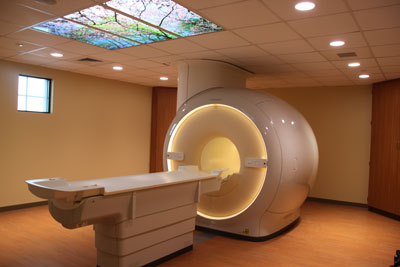 Has your doctor ever recommended that you get an MRI (magnetic resonance imaging) exam? Or are you simply curious about this safe imaging test? There’s no better place to schedule an MRI exam than Littleton Regional Healthcare. The Philips Ingenia 1.5T delivers superb image resolution, fast exams, and a more open patient experience you can feel good about.
Has your doctor ever recommended that you get an MRI (magnetic resonance imaging) exam? Or are you simply curious about this safe imaging test? There’s no better place to schedule an MRI exam than Littleton Regional Healthcare. The Philips Ingenia 1.5T delivers superb image resolution, fast exams, and a more open patient experience you can feel good about.
Our Ingenia 1.5T can scan patients of varying size, age, and medical condition in less time than previous MR systems on the market. Routine exams of the brain, spine, knee, ankle, and liver are quick and easy. And even more complex scans may only last 15 to 40 minutes.
Our Ingenia 1.5T has a wide-bore opening to make you feel less confined. In fact, most scans can be done with your head completely out of the system. The Philips Ingenia 1.5T delivers the revealing images your doctor needs to help diagnose your medical condition correctly. This makes it easier for your doctor to identify and pinpoint any potential problems and helps reduce the number of repeat exams.
If you need an MRI exam, but you have a pacemaker, you still may be able to have the scan. If you have an “MR Conditional” pacemaker, our technologists can coordinate your exam with one of the cardiologists affiliated with LRH to help you get the care you need in a safe manner.
The right choice for imaging. Philips Ingenia 1.5T is one more reason to ask your doctor about scheduling your next diagnostic imaging exam at Littleton Regional Healthcare. Our hours of operation are Monday-Friday, 7 am-5 pm, with the last exam of the day scheduled at 4 pm.
Littleton Regional Healthcare is proud to offer the Aquilion ONE 640 Series multi-functional Dynamic Volume CT scanner with Adaptive Iterative Dose Reduction 3D (AIDR 3D). This scanner is capable of not only performing routine multi-slice imaging but covering entire organs dynamically with lower radiation and less contrast dose.
CT scanning, sometimes called CAT scanning, is a non-invasive painless medical test that helps physicians diagnose and treat medical conditions. CT imaging uses special x-ray equipment to produce multiple images or pictures of the inside of the body and a computer to join them together in cross-sectional views of the area being studied. The images can then be examined on a computer monitor or printed. CT scans of internal organs, bone, soft tissue, and blood vessels provide greater clarity than conventional x-ray exams. Using specialized equipment and expertise to create and interpret CT scans of the body, radiologists and physicians can easily diagnose problems such as cardiovascular disease, cancers, infectious disease, trauma, and musculoskeletal disorders.
The CT scanner is a large machine with a hole in the center. You will lie on a table, which slides into and out of the hole. The x-ray tube and electronic x-ray detectors rotate around you. They are opposite each other in a ring, called a gantry. The computer workstation that processes the imaging information is located in a separate room.
Patient Benefits:
- Diagnostic option for the workup of a cardiac patient
- Faster patient exams capturing images with reduced radiation doses, increasing patient safety, and comfort
- Less time needed for breath holds, which can mean less stress for patients
- Easier access/wheelchair access to the patient table with lower table height
Physician Benefits:
- Stroke triage with a 60-second exam
- Cardiac CTA in as little as ONE beat
- Single Energy Metal Artifact Reduction (SEMAR) helps ensure clear imaging when scanning areas with metallic implants
Common Procedures:
- Cardiac and coronary vessel analysis
- Trauma/emergency room/chest pain management
- Stroke workup
- Oncology and cancer care
- Spinal injuries
- Abdominal injuries
- Pediatric injuries
- Kidney exams
- Liver exams
- Lung exams
Computed Tomography or CAT Scan
1. What is the doctor looking for?
CT scans are used to evaluate the cause of pain, infections, stones, blockages, and fractures or to look for masses. CT Angiography uses IV contrast (sometimes called “dye”) to evaluate blood flow.
2. What is the test?
It is an x-ray procedure, which is performed to analyze internal structures of any body part, and to aid in diagnosing disease.
3. Where is the test done?
CT scans are performed within the radiology department.
4. May I eat or drink?
Yes, but if you are given liquid barium as a test preparation or if you will be receiving IV contrast, please follow the specified time instructions.
5. What about medication?
If the CT test was ordered without contrast, you may take your medications. If your CT test was ordered with contrast, please follow the directions in #6.
6. Is there anything special I need to know if my CT test is ordered with contrast?
Yes. There are blood tests (BUN and Creatinine) that need to be done before your CT test with contrast if you:
- Are 60 years of age or older
- are diabetic (all types)
- have multiple myeloma
- have kidneys that do not perform at their best
Be sure that your doctor gives you an order for the blood tests, which can be done in the lab before your CT test. Please note, if you have the blood test on the same day as your CT, you will need to plan for having it done at least 1 hour prior to your exam.
If you have had the BUN and Creatinine test done within the last two weeks (14 days), you can:
- bring the results with you in the morning of the test.
- ask the doctor to fax the results to 603.444.2343 before the date of your CT test.
Note: If you take Metformin, stop taking it at the time of the CT test. (Includes Glucophage, Glucophage XR, Glucovance-Glyburide, Avandamet-Rosiglitazone, Metaglip-Glipzide, and Metformin)
7. Will I have an I.V?
Depending on the kind of exam you may have an I.V. of x-ray contrast in a vein in your arm during the exam.
8. Do I need special clothing?
It is not necessary to get undressed for the procedure. You may be directed to move away belts, zippers, pins that would be in the way of the scan.
9. What should I bring?
The order for the procedure.
10. What to expect?
During the C.T. examination, the patient will lie on a cushioned table, which will move through a large donut-shaped x-ray machine.
Images are obtained at many different angles around the body. It is important during the CAT scan that the patient remains as still as possible.
The technologist will ask the patient to hold their breath for several brief seconds. The technologist directly watches the patient through an observation window during the procedure for patient safety.
11. How long does the test take?
Be prepared to be at the hospital for 1 hour.
12. Tell your doctor if you
Have a history of having an allergic reaction to IV contrast as your doctor may want to prescribe a medication for you to take prior to the procedure.
13. Will the test make me sick or sleepy?
Occasionally the oral barium may give people diarrhea. The I.V. contrast may make a patient feel warm and give a metal taste during the administering of the contrast. This will only last a few seconds and the patient should feel fine upon leaving.
14. Will I receive radiation during the procedure?
Yes, in the form of x-rays. Special care is taken to minimize the dose of radiation through a trained technologist, but the benefit of an accurate diagnosis far outweighs the risk.
15. What if I am pregnant?
Only for special circumstances should pregnant women receive a CT scan. It would be at the agreement of her doctor and the radiologist. Anyone suspecting they may be pregnant should notify the ordering physician and the CT Technologist.
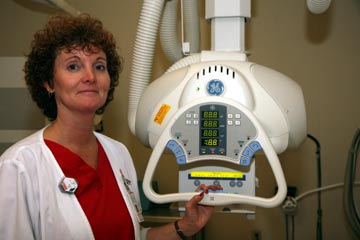 Many imaging examinations require that patients prepare themselves ahead of time to obtain the best imaging possible.
Many imaging examinations require that patients prepare themselves ahead of time to obtain the best imaging possible.
You should be told about any special preparation when your examination is scheduled. Preparation for inpatients occurs in the hospital, ordered by your doctor, and hospital nurses will direct you in the preparation.
Typical examinations requiring special patient preparation include:
- Most ultrasound, CT, and MR scans
- Special procedures and interventional examinations
- Most GI and GU examinations including IVP (intravenous pyelogram, intravenous urogram), studies of the esophagus, stomach (upper GI), and colon (barium enema)
- Mammography (breast imaging)
- Many Nuclear Medicine studies
For additional information regarding any of the procedures listed above, please visit http://www.radiologyinfo.org.
Please contact our receptionist desk at 603.444.9536 during regular business hours if you have any questions about your exam or preparation.
Does my doctor need to order my examination?
Yes. Diagnostic Imaging Services at LRH requires a written referral (sometimes called a requisition, order, or request) from a physician, physician assistant, or nurse practitioner for imaging examinations. This is similar to the requirements for patients to obtain prescription drugs or other doctor-ordered patient care items.
Do I need an appointment?
It depends on the examination. Outpatient plain films (for example, chest X-rays, or bone films like ankles or wrists) are performed on a walk-in basis. More specialized examinations are performed by appointment, including mammography (breast imaging), gastrointestinal examinations (such as upper GI series or barium enema), genitourinary examinations (such as an IVP), and ultrasound, computed tomography (CT),, nuclear medicine (NM) and MRI (magnetic resonance imaging) scans.
What paperwork should I bring with me?
Most outpatients should bring the written request (sometimes called “the order” or “the referral”) from their doctor. (Sometimes these requests are sent ahead to the radiology department, especially for examinations scheduled in advance by appointment.) If you received any appointment slips or patient preparation instructions, bring these along, too.
It is also advisable to bring a list of your current medications (or you can bring the medications themselves) and any information you have about any allergies you may have. Information on medicines and allergies is not needed for simple X-rays like a chest X-ray or an ankle film, but sometimes patients do not realize they are really scheduled for more complicated studies like a chest CT. If in doubt, bring the information.
Where can I get more information about my test or procedure?
Visit: www.radiologyinfo.org
Will my insurance cover this test?
Coverage for imaging tests is variable and depends on your insurance carrier, your plan, your deductible, any exclusions, and sometimes the indications for the examination. We are not able to interpret your policy. We encourage you to contact your insurance company to confirm your coverage and any financial responsibility for your imaging exam(s).
